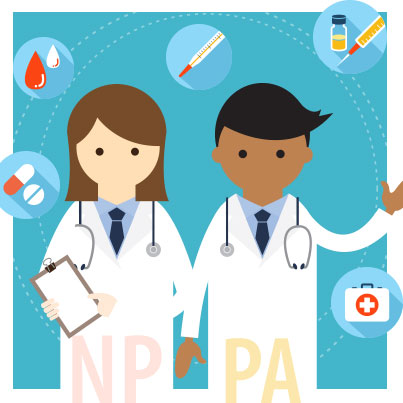Choose A Team Approach To Health Care
- Category: Community Newsletter
- Posted On:
- Written By: Percival Kane
To download a PDF version of this article as it appears in our newsletter CommUnity, please click here.
 If your child takes a tumble, but your pediatrician isn’t immediately
available, you may find that seeing a Physician Assistant (PA) or Nurse
Practitioner (NP) is a great option.
If your child takes a tumble, but your pediatrician isn’t immediately
available, you may find that seeing a Physician Assistant (PA) or Nurse
Practitioner (NP) is a great option.
While some folks are just learning about the benefits of including PAs and NPs (also called “advanced practitioners”) on their health team, these professionals have been helping patients since the 1960s. In our area, you will find advanced practitioners in hospitals and in clinics like primary care, orthopedics and cardiology. PAs and NPs care for an assortment of conditions, treat a wide range of illnesses and offer medical advice. They both receive intense training, and are licensed and accredited by exam. But, there are some clear distinctions between the roles. Most noticeably, educational paths and backgrounds for NPs and PAs are different.
Nurse Practitioners
NPs are educated under the nursing model, which stresses health promotion and education. They are independent practitioners, and can have their own clinics, develop detailed treatment plans and prescribe medications.
As a new mother, Shantel Johnson appreciates the time and care provided by NP Zandi Hudspeth, who works at North Oaks Walk-In Clinics in Hammond and Ponchatoula. When her 6-month-old son developed a fever after hours, Johnson was able to see Hudspeth right away without an appointment. “I was worried he might have something more serious than a cold. She gave him a thorough examination,” Johnson remarks. “I felt very comfortable with the care she gave him and appreciated the time she took to answer my questions and explain what he was experiencing and how to treat him.”
Polly Burrall, an NP at North Oaks Family Medicine in Hammond, became an NP after practicing as a Registered Nurse for several years, and she believes one of her most important responsibilities is as a patient advocate.
“I am a primary care provider, but I also see myself as a Physician extender,” Burrall explains. “I help patients get quicker access to quality health care through an office visit, a medication refill or reading lab or diagnostic test results.”
Dr. Herbert Robinson works closely with Burrall, and he credits her as a “very important part of my practice. We collaborate on our patients’ care in efforts to assure they receive the best medical treatment. Together, we are able to respond more quickly to our patients’ needs.”
Physician Assistants
A PA is required to have a certain number of hours directly caring for patients (for example, as a paramedic) before entering the PA program through a medical school or center of medicine. PAs can also specialize in areas like emergency medicine and general surgery. However, they cannot work independently of Physicians. Physicians and PAs work together as a team, and collaborate to care for their patients.
Marc Pitre, a Physician Assistant who works under the direction of Physicians and Surgeons at North Oaks Orthopedic Specialty Center, sees his role as an extension of the Physician’s. In surgery,he might serve as a first assistant, which many years ago was a role taken by a second surgeon during more complicated surgeries.
“Under the Physician’s supervision, we carry out those duties which have been delegated to us through our training, experience and competence,” he adds.
With the backing of a team of health care professionals, the patient benefits in many ways – from easier access to appointments to the collective medical knowledge of the team. This team approach offers the patient a full range of health care services that efficiently ensures the most accurate diagnoses and appropriate treatments.
Physicians, NPs and PAs strive to provide high-quality, patient-centered and team-based care that improves the health of those they serve.
Like a doctor, NPs and PAs are qualified to:
- manage the overall care of a patient
- diagnose and treat conditions
- prescribe medications
- educate patients on preventing disease and managing conditions.




[1].jpg)